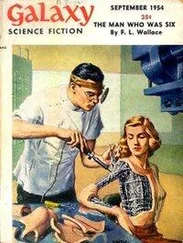A brave title. Dignified and erudite. And a lot of work. Twenty years of work. Twenty years of digging among old dusty records, twenty years of reading and comparing, of evaluating the weight and words of those who had gone before, sifting and rejecting and working out the facts, tracing the trend not only of the city but of men. No hero worship, no legends, but facts. And facts are hard to come by.
Something rustled. No footstep, but a rustle, a sense that someone was near. Webster twisted in his chair. A robot stood just outside the circle of the desk light.
“Beg pardon, sir,” the robot said, “but I was supposed to tell you. Miss Sara is waiting in the Seashore.”
Webster started slightly. “Miss Sara, eh? It’s been a long time since she’s been here.”
“Yes, sir,” said the robot. “It seemed almost like old times, sir, when she walked in the door.”
“Thank you, Roscoe, for telling me,” said Webster. “I’ll go right out. You will bring some drinks.”
“She brought her own drinks, sir,” said Roscoe. “Something that Mr. Ballentree fixed up.”
“Ballentree!” exclaimed Webster. “I hope it isn’t poison.”
“I’ve been observing her,” Roscoe told him, “and she’s been drinking it and she’s still all right.”
Webster rose from his chair, crossed the room and went down the hall. He pushed open the door and the sound of the surf came to him. He blinked in the light that shone on the hot sand beach, stretching like a straight white line to either horizon. Before him the ocean was a sun-washed blue tipped with the white of foaming waves.
Sand gritted underneath his feet as he walked forward, eyes adjusting themselves to the blaze of sunlight.
Sara, he saw, was sitting in one of the bright canvas chairs underneath the palm trees and beside the chair was a pastel, very ladylike jug.
The air had a tang of salt and the wind off the water was cool in the sun-warm air.
The woman heard him and stood up and waited for him, with her hands outstretched. He hurried forward, clasped the outstretched hands and looked at her.
“Not a minute older,” he said. “As pretty as the day I saw you first.”
She smiled at him, eyes very bright. “And you, Jon. A little gray around the temples. A little handsomer. That is all.”
He laughed. “I’m almost sixty, Sara. Middle age is creeping up.”
“I brought something,” said Sara. “One of Ballentree’s latest masterpieces. It will cut your age in half.”
He grunted. “Wonder Ballentree hasn’t killed off half Geneva, the drinks that he cooks up.”
“This one is really good.”
It was. It went down smooth and it had a strange, half metallic, half ecstatic taste.
Webster pulled another chair close to Sara’s, sat down and looked at her.
“You have such a nice place here,” said Sara. “Randall did it, didn’t he?”
Webster nodded. “He had more fun than a circus, I had to beat him off with a club. And those robots of his! They’re crazier than he is.”
“But he does wonderful things. He did a Martian room for Quentin and it’s simply unworldly.”
“I know,” said Webster. “Was set on a deep-space one for here. Said it would be just the place to sit and think. Got sore at me when I wouldn’t let him do it.”
He rubbed the back of his left hand with his right thumb, staring off at the blue haze above the ocean. Sara leaned forward, pulled his thumb away.
“You still have the warts,” she said.
He grinned. “Yes. Could have had them taken off, but never got around to it. Too busy, I guess. Part of me by now.”
She released the thumb and he went back to rubbing the warts absent-mindedly.
“You’ve been busy,” she said. “Haven’t seen you around much. How is the book coming?”
“Ready to write,” said Webster. “Outlining it by chapters now. Checked on the last thing today. Have to make sure, you know. Place way down under the old Solar Administration Building. Some sort of a defense set-up. Control room. You push a lever and—”
“And what?”
“I don’t know,” said Webster. “Something effective, I suppose. Should try to find out, but can’t find the heart to do it. Been digging around in too much dust these last twenty years to face any more.”
“You sound discouraged, Jon. Tired. You shouldn’t get tired. There’s no reason for it. You should get around. Have another drink?”
He shook his head. “No, Sara, thanks. Not in the mood, I guess. I’m afraid, Sara—afraid.”
“Afraid?”
“This room,” said Webster. “Illusion. Mirrors that give an illusion of distance. Fans that blow the air through a salt spray, pumps that stir up the waves. A synthetic sun. And if I don’t like the sun, all I have to do is snap a switch and I have a moon.”
“Illusion,” said Sara.
“That’s it,” said Webster. “That is all we have. No real work, no real job. Nothing that we’re working for, no place we’re going. I’ve worked for twenty years and I’ll write a book and not a soul will read it. All they’d have to do would be spend the time to read it, but they won’t take the time. They won’t care. All they’d have to do would be come and ask me for a copy—and if they didn’t want to do that I’d be so glad someone was going to read it that I’d take it to them. But no one will. It will go on the shelves with all the other books that have been written. And what do I get out of it? Wait… I’ll tell you. Twenty years of work, twenty years of fooling myself, twenty years of sanity.”
“I know,” said Sara, softly. “I know, Jon. The last three paintings—”
He looked up quickly. “But, Sara—”
She shook her head. “No, Jon. No one wanted them. They’re out of style. Naturalistic stuff is passé. Impressionalism now. Daubs—”
“We are too rich,” said Webster. “We have too much. Everything was left for us—everything and nothing. When Mankind went out to Jupiter the few that were left behind inherited the Earth and it was too big for them. They couldn’t handle it. They couldn’t manage it. They thought they owned it, but they were the ones that were owned. Owned and dominated and awed by the things that had gone before.”
She reached out a hand and touched his arm.
“Poor Jon,” she said.
“We can’t flinch away from it,” he said. “Some day some of us must face the truth, must start over again—from scratch.”
“I—”
“Yes, what is it, Sara?”
“I came here to say good-by.”
“Good-by?”
“I’m going to take the Sleep.”
He came to his feet, swiftly, horrified. “No, Sara!”
She laughed and the laugh was strained. “Why don’t you come with me, Jon. A few hundred years. Maybe it will all be different when we awake.”
“Just because no one wants your canvases. Just because—”
“Because of what you said just a while ago. Illusion, Jon. I knew it, felt it, but I couldn’t think it out.”
“But the Sleep is illusion, too.”
“I know. But you don’t know it’s illusion. You think it’s real. You have no inhibitions and you have no fears except the fears that are planned deliberately. It’s natural, Jon—more natural than life. I went up to the Temple and it was all explained to me.”
“And when you awake?”
“You’re adjusted. Adjusted to whatever life is like in whatever era you awake. Almost as if you belonged, even from the first. And it might be better. Who knows? It might be better.”
“It won’t be,” Jon told her, grimly. “Until, or unless, someone does something about it. And a people that run to the Sleep to hide are not going to bestir themselves.”
She shrank back in the chair and suddenly he felt ashamed.
Читать дальше












